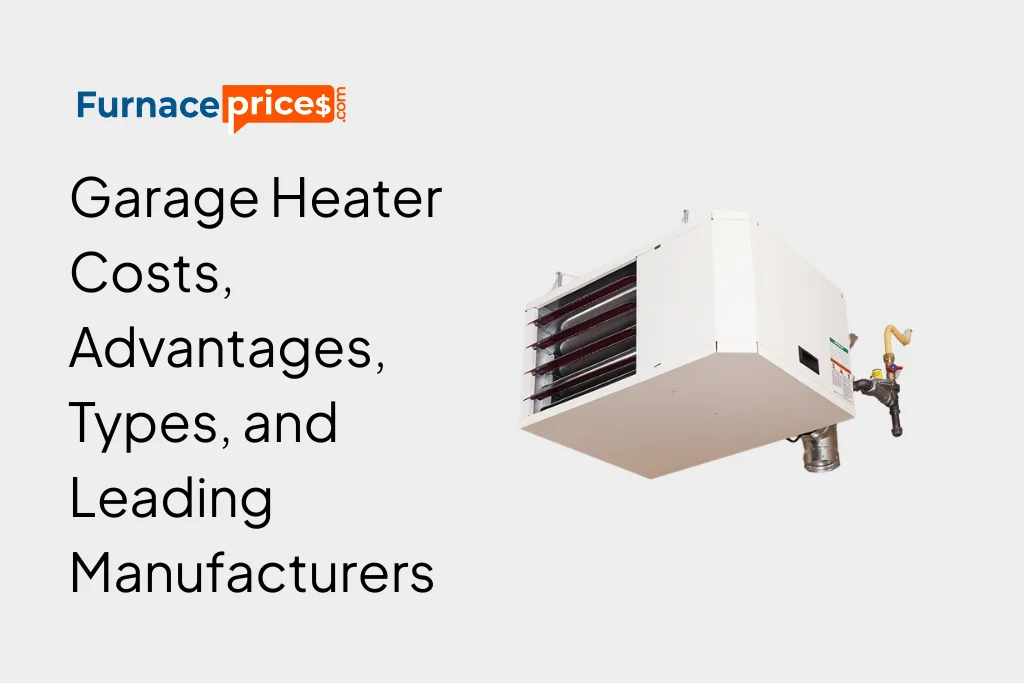Perhaps you’ve come across those convenient appliances we know as garage heaters. If you’re on the fence about whether one is the right fit for your workshop or vehicle space, this guide aims to provide clarity and simplify your decision. We’ll explore the main benefits, the primary models available, the top brands in the market, and, critically, typical garage heater prices for Canadian homeowners.
The Perks of Warming Your Workshop or Garage with a Dedicated Heating Unit
The benefits of adding heat to your detached space go far beyond just comfort. A quality self-contained heater can transform an uninviting area into a functional, year-round extension of your home.
The most apparent benefit is, naturally, warmth. For anyone who dedicates significant time to their garage or workspace—be it for a home-based business, car maintenance, woodworking projects, or just a hangout spot—a dedicated heater is a huge asset. It offers a generally non-intrusive and cost-effective way to stay comfortable while you work.
Enhanced Property Value
A well-installed, high-quality garage heater can subtly increase the appeal and value of your home. While you might not use it constantly, potential future buyers often view the presence of a proper heating solution as a major upgrade and a great bonus feature, making the property more desirable.
Minimal Upkeep
Maintaining a garage heater doesn’t require complex technical knowledge. Because these are typically self-contained units that heat the air directly, they are usually lower maintenance and simpler to service or repair compared to extending your home’s central furnace system.
Straightforward Installation
Given their moderate size and focused purpose, installing many garage heaters is often quite uncomplicated. This is especially true for electric models, which eliminate the complexities and costs associated with running new gas lines.
Space Efficiency
Garage heaters are designed to be compact and space-conscious. Since garages are often multi-functional areas where storage space is at a premium, the small footprint of most units is a major advantage. Many popular models are engineered for wall or ceiling mounting, freeing up valuable floor area.
Protecting Vehicles and Gear
In many parts of Canada, where winters can be intense, a heater ensures your vehicle is ready to go without the need for an engine block heater or a long, cold warm-up. Furthermore, if you store sensitive items like electronics, tools, paints, or expensive equipment, a stable heated environment prevents damage from extreme cold and condensation build-up.
Canadians are well-known for enduring some of the world’s most severe winters—it’s a point of national pride! But that doesn’t mean we can’t leverage modern heating technology to make working and living in the cold vastly easier. Let’s delve into the main types of garage heaters, their unique operational features, and typical price ranges.
Garage Heater Varieties and Models
If you’ve read this far, you’re likely ready to consider which style of garage heater is best suited for your needs. There are several different technologies, each presenting its own set of advantages. Review this breakdown to help narrow down your choice:
1. Electric Garage Heaters
- Energy Source: Electricity
- Key Advantage: Easiest and least complex installation.
- Typical Cost Range (Unit Only): $100 to $500
- Notes: Adds about $20 to $100+ to the monthly electricity bill, depending on usage.
2. Natural Gas Garage Heaters
- Energy Source: Natural Gas Line
- Key Advantage: Powerful, inexpensive to run long-term, best for large spaces.
- Typical Cost Range (Unit Only): $400 to over $2,100
- Notes: Requires professional gas line installation, which adds hundreds (up to $1,000) to the final cost.
3. Propane Garage Heaters
- Energy Source: Propane Tank
- Key Advantage: Very effective and provides excellent reliable heat.
- Typical Cost Range (Unit Only): $150 to $450 (Small) or up to $1,000+ (Large)
- Notes: Excellent for portability or spaces without easy gas line access.
4. Infrared Garage Heaters
- Energy Source: Electric or Gas
- Key Advantage: Heats objects/people directly, very quiet and economical to operate.
- Typical Cost Range (Unit Only): $150 to $300 (Small) or up to $500 (Heavy Duty)
- Notes: Does not heat the air in the entire space; heats only the area below or near it.
Electric Garage Heaters
Electric garage heaters are generally the simplest to set up. As their name implies, they convert electrical energy into heat, drawing power from your home’s electrical supply. This makes them a strong choice for those who are cautious about extending gas lines or dealing with external fuel tanks. On average, running an electric heater can add anywhere from $20 to over $100 to your monthly electricity bill, and the initial unit purchase can range from $100 to $500.
Natural Gas Garage Heaters
Natural gas heaters draw fuel from your existing main gas line. This is an excellent solution if your gas line is already positioned close to your garage, simplifying the installation process. While the initial purchase cost is higher than that of an electric model, natural gas is significantly more affordable than electricity, potentially leading to greater long-term savings in operating expenses. They are also typically much more powerful and are therefore ideal for expansive spaces, larger residential garages, and small or mid-sized commercial workshops. Their BTU output can range widely from 45,000 to 400,000 BTUs, and these professional-grade units cost anywhere from $400 up to and exceeding $2,100. Remember to factor in the installation price, which is mandatory and can run from a few hundred dollars up to $1,000, fluctuating based on the complexity of running the gas and venting lines.
Propane Garage Heaters
Propane gas heaters operate similarly to natural gas units: they generate a flame within a heat exchanger and distribute the resulting warm air with a fan. Propane units are known for being highly effective and reliable for steady comfort. A basic residential propane garage heater can cost between $150 to $450 on the low end, with larger or more robust commercial units reaching $1,000 or more.
Infrared Garage Heaters
Rather than heating the entire volume of air in a garage, infrared garage heaters focus their heat on objects or people directly in their path. They are often economical compared to convective gas or electric models and run much quieter. Smaller, more portable infrared units typically cost around $150 to $300, while powerful, permanently mounted industrial units can cost up to $500.
It’s common to find electric, propane, and smaller infrared heaters at major Canadian hardware retailers. Conversely, natural gas units—which require specific venting and gas line connections—are usually purchased directly from licensed HVAC contractors and distributors who handle the professional installation.
Leading Garage Heater Brands and Manufacturers
The market offers many quality manufacturers known for specific strengths, whether that’s durability, installation simplicity, or affordability.
- Durable & High-Performance Electric Units: Some manufacturers specialize in electric garage heaters that are recognized for their durability and ability to deliver substantial heat even for demanding garage environments. While they may come with a higher price tag, the return on investment is high for those who use their space regularly.
- Ease of Installation: Other popular brands cater to homeowners by designing products that minimize the complications of setup. They are often favourites among consumers looking for a quick and less technical installation process.
- Economical Entry Point: There are brands that stand out for offering models at a very competitive, low price point. If your priority is achieving the greatest upfront savings, these models provide an excellent and accessible starting place.
- Speed and Efficiency: Certain manufacturers are known for producing garage heaters that are exceptionally quick to heat up a space. They also tend to focus on overall efficiency and a high-quality, smart design aesthetic.
- Compact Power: You’ll find brands that focus on maximizing heat output in a very small form factor. These compact units can still effectively warm an average-sized two-car garage despite their minimal size, making them perfect where space is truly limited.
- Natural Gas Specialists: Many of the most respected, long-standing HVAC system manufacturers offer a robust selection of garage heaters, often concentrating on powerful natural gas models designed for permanent installation.
In Conclusion
Regardless of how you utilize your garage space—whether it’s a dedicated hobby spot, a workspace, or just vehicle storage—installing a heater is an excellent upgrade, particularly in the colder provinces and regions of Canada, from Alberta, Manitoba, and Saskatchewan to cities like Edmonton, Ottawa, St. John’s, and Northern Ontario, and everywhere in between.
To simplify the process of upgrading, many Canadian HVAC resources offer services to connect homeowners with local, licensed companies and distributors who can provide free, no-obligation quotes for a new natural gas garage heater, including all-in installation costs.
The goal is always to make upgrading your heating and cooling systems as simple and transparent as possible.
For more information on energy efficiency standards and incentives in Canada, visit Natural Resources Canada.
Are you leaning toward the low running costs of a natural gas unit, or the simplicity of an electric plug-and-play model for your Canadian garage?
📞 Have questions? Contact us or email us at contact@furnaceprices.com.
✅ Start comparing today and make the right choice with confidence!







